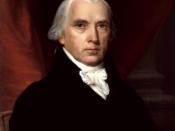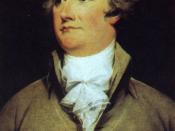According to Alexander Hamilton and James Madison, authors of the Federalist Papers, the union of the States would be better as a large republic, firmly connected by a more powerful, centralized government than that which existed under the Articles of Confederation. The necessity of such a government lies in the need for the fledgling country to control both internal and external disputes, arising from internal factions, or from foreign threats. In their opinion, an extended Union would accomplish this. Their arguments for an extended republic are expounded in Federalist Papers nine and ten.
In Federalist 9, Hamilton raises the subject of the utility of the Union in controlling domestic faction and insurrection. Hamilton first cites the history of Greece, a democracy, as one of turmoil and factious division. Their errors have been used by many to cite the dangers of republican government. Hamilton argues that the mistakes made by the Greeks, for instance, can be used to strengthen the American case, and that the 'science of politics,' has improved as changes have been made to the utility of republican government and help to control the turmoil and the corruption which befell the Greeks, such as checks and balances, courts, and the election of representatives.
(Hamilton 40). To these improvements, he contends the extension of the Union should also be added.
Hamilton also acknowledges the arguments of the contenders of the Constitution. Their line of reasoning based on Montesquieu, they maintain that republics should be smaller in land area. Hamilton asserts that if Montesquieu's recommendations were adhered to, then the result would be either a return to monarchy, or dissolution into a magnitude of "little, jealous, clashing, tumultuous commonwealths...objects of universal pity and contempt" (Hamilton 42). Neither would benefit America as a whole. Hamilton then goes on to assert that...

![Socialists in Union Square, N.Y.C. [large crowd] Photo, 1 May 1912 - Bain Coll. (LOC)](https://s.writework.com/uploads/5/54413/socialists-union-square-n-y-c-large-crowd-photo-1-may-1912-b-thumb.jpg)
